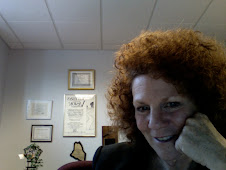Today is a snow day here in Maine for most of our schools. One of the few happy remnants of our tenacious hold on the anachronistic agrarian calendar!
At NSDC Parker Palmer encouraged us to take back our profession and do what we know is right for our youth. Another keynoter, Jennifer James, also fomented revolution - a call to the Volunteers of America (and the world).
Jennifer is an urban cultural anthropologist whose main message is, "Civilization is ultimately the long process of learning to be kind. Take good care of yourself so you can take care of the rest of us." Before she began talking about schools in particular she created a context for the upheaval in which we find ourselves and our world. Jennifer defined culture as a tapestry that we constantly weave and unravel and re-weave. She said that currently the pace of change has been so fast and our leaders so focused on the short-term that our tapestry is in tatters. For us to have hope we need visionary leaders who can help us to see the new tapestry as we weave it, and who guide us to develop new wisdom traditions. Visionaries like Martin Luther King, Jr. and Nelson Mandela unwound the old tapestries of their cultures and showed people what it would look like when we aligned our lives with our values. King had been to the "mountaintop" and had seen the "Promised Land." He knew he may not get there with us but was sure that we would. We wove a new tapestry and created a new culture. The roots of King's wisdom tradition grew from his faith, his values and his integrity.
Jennifer said that the "pace of change is robbing us of our wisdom traditions and we must bring them back -- we must be honest brokers of knowledge." She said that when we learn to concentrate our energy -- through technology, the economy, hierarchy -- we will begin to make real change. We can begin to change our belief systems, our mythologies, our culture. "When the peasants learn to read the kings lose power," she said, speaking broadly yet also referring to our current focus on corporate wealth. And, conversely, "the more you push poor people off the edge the more they will burn down the cities." This current wave of greed must be neutralized with compassion and the path of the heart.
Her message to us as educators was that we cannot in good conscience sit by and watch as the tapestry unravels. She sees teachers depressed, anxious and frightened by the learning curve ahead of them. As leaders in education we could learn from the leaders in the nursing profession, who, over the last generation, raised their own standards and pushed each other to meet them, and thereby elevated themselves to true professionals. Jennifer challenged us to give up tenure in exchange for professional respect, to demand higher salaries in turn for greater results -- and to take full responsibility to become more competent on our own. She challenged us to make reform through strategic partnerships with business and ocmmunity, and to not let what she called the "teaching lodge" (establishment) get in our way.
Lastly, in Jennifer's new book, Cultural Intelligence, she will teach us how to develop this skill critical to surviving and thriving in the 21st century. I am getting ready to read her book, Thinking in the Future Tense, while I await the new one...
...and while I join the rest of you in the street.
Thursday, December 20, 2007
Subscribe to:
Post Comments (Atom)


2 comments:
"One of the few happy remnants of our tenacious hold on the anachronistic agrarian calendar"
HEY ... you are WAY out of touch with the resurgence of small farm / local food movement.. it will become even more important in geographic some areas to accommodate labor during the year.
How many crops do you grow in your house, in your driveway, in a window box.. how long can you survive on them ?
Speaking of geographical areas - energy costs and consolidation will be involved in a head-on collision... run with that thought as well.
Hey, Sciencefarmer, I think you got me wrong. I am all for local food and small farms. I am actually lobbying for growing our own food in our schools so our youth can learn how to feed themselves.That would be way preferable to school breakfast and lunch programs that depend on tracking what they call food across the country. The comment simply referred to an outdated schedule that suggests that learning doesn't take place in the summer. Perhaps some days young people will work alongside small farmers year round as part of their educational program. Thanks for the provocative post.
Post a Comment